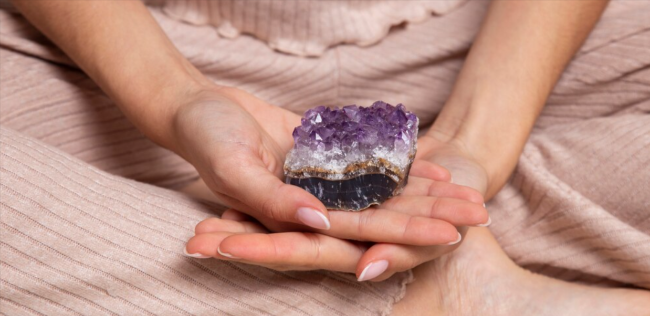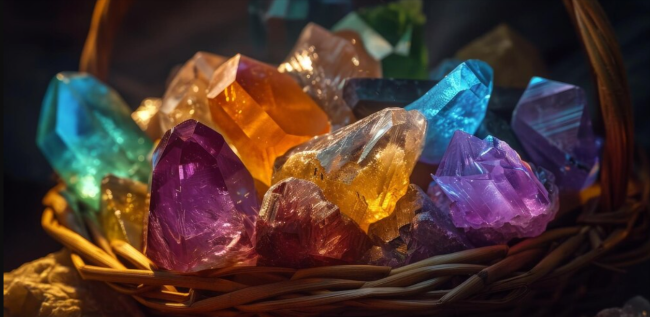Ever wondered about the divine perspective on crystals? Curious to explore what the Bible reveals about these shimmering gems of the earth? Delve into the intriguing insights that shed light on what does the Bible say about crystals.
Uncover ancient wisdom and spiritual significance that may surprise you, offering a fresh understanding of these natural wonders.
Discover how these earthly treasures intertwine with faith and spirituality, enriching our understanding of both the physical and metaphysical realms.
Quick Summary
The Bible doesn’t specifically mention crystals, but it warns against idolatry and relying on objects for spiritual power instead of God.
What Does The Bible Say About Crystals?
The Bible does not specifically mention crystals in the context of healing or spiritual practices. However, it emphasizes relying on God alone for guidance and power.
Passages like Deuteronomy 18:10-12 warn against engaging in divination or occult practices, which can include using objects for spiritual purposes.
Isaiah 2:6 criticizes seeking knowledge from sources other than God. The Bible’s overarching message is to trust in God’s power and guidance rather than objects or rituals.
For example, in the Book of Exodus, descriptions of precious stones like jasper and sapphire are found in the context of the breastplate worn by the high priest.
Interpretations
Various interpretations exist regarding the significance of crystals in the Bible. Some individuals view crystals as part of God’s creation, highlighting their beauty and potential symbolism.
Others caution against associating crystals with spiritual practices outside of biblical teachings.
Symbolism
In biblical contexts, crystals are often linked to purity, clarity, and strength. For instance, references to crystal-clear waters or visions of a sea like crystal emphasize qualities such as transparency and divine perfection.
These symbolic representations underscore the importance of moral purity and righteousness.
Controversies
- Some religious groups discourage the use of crystals due to concerns about idolatry or divination practices.
- Others argue that appreciating the natural beauty of crystals aligns with biblical principles of valuing God’s creation.
Can Crystals Have Spiritual Meanings?
Crystals have been used for spiritual purposes for centuries, with various beliefs surrounding their abilities to enhance energy and promote healing.
Many individuals incorporate crystals into their meditation practices to amplify intentions and connect with higher realms.
Historical Significance
Throughout history, crystals have held significant roles in different cultures and religions.
Ancient civilizations like the Egyptians and Greeks believed in the metaphysical properties of crystals, using them for protection, guidance, and healing purposes. These practices have transcended time and are still prevalent in modern spirituality.
Types of Crystal Meanings
Different crystals are associated with unique spiritual meanings based on their colors, shapes, and properties. For example, amethyst is often linked to spiritual growth and intuition, while rose quartz symbolizes love and compassion.
Understanding these associations can help individuals harness the energies of specific crystals for personal growth and spiritual development.
Controversies Surrounding Crystal Use
While many people find solace and guidance through crystals, there are controversies surrounding their effectiveness in spiritual practices.
Skeptics argue that any perceived benefits from crystals are merely a result of a placebo effect or psychological factors rather than inherent spiritual properties. It’s essential for individuals to approach crystal use with an open mind and discernment.
Are There Risks In Using Crystals?
Using crystals inappropriately can lead to negative consequences such as attracting unwanted energies and disrupting spiritual balance. It’s crucial to cleanse and charge crystals regularly to maintain their positive effects.
Fake Crystals
Be cautious of fake crystals in the market, as they lack the genuine healing properties of natural crystals. These imitations can mislead users and prevent them from experiencing the true benefits of authentic crystal healing.
Overreliance on Crystals
Relying too heavily on crystals for spiritual guidance may inhibit personal growth and self-reliance. While crystals can be powerful tools, it’s essential to cultivate inner strength and intuition without solely depending on external sources.
Unethical Sourcing
The unethical sourcing of crystals, such as through exploitative mining practices or environmental damage, can have harmful impacts on communities and ecosystems. It’s important to support ethical suppliers who prioritize sustainability and fair trade practices.
How Should Christians Approach The Use Of Crystals?
The Bible does not explicitly mention the use of crystals, leading to differing opinions among Christians. Some believe that using crystals for healing or spiritual purposes goes against biblical teachings, while others view them as natural elements created by God.
Discernment and Intent
Christians are advised to approach the use of crystals with discernment and clarity of intention.
It is essential to evaluate whether the practice aligns with their faith and values, focusing on intentions of healing, meditation, or decoration rather than seeking power from the crystals themselves.
Seeking Guidance
When considering the use of crystals, Christians can seek guidance from church leaders or spiritual mentors to ensure their actions are in line with biblical principles.
Engaging in prayer and reflection can help individuals make informed decisions about incorporating crystals into their lives.
Conclusion
In exploring what the Bible says about crystals, you’ve gained insight into various perspectives. Whether you view them as mere creations of nature or imbued with spiritual significance, your understanding has deepened.
Remember to approach such topics with an open mind and respect for diverse beliefs. Keep seeking knowledge and engaging in thoughtful discussions to broaden your perspective further.





Leave a Comment